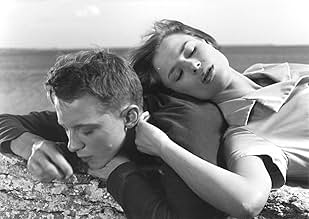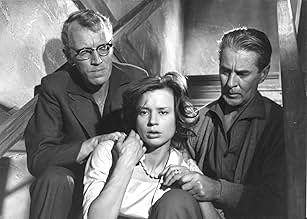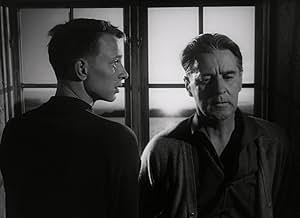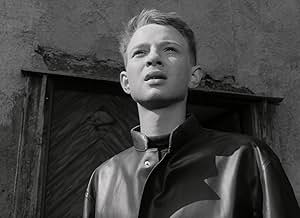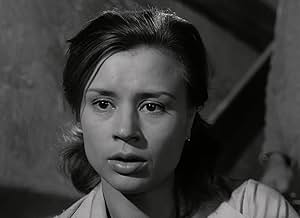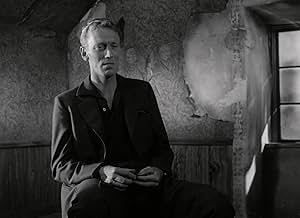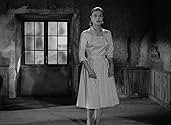IMDb RATING
7.9/10
29K
YOUR RATING
Recently released from a mental hospital, Karin rejoins her emotionally disconnected family in their island home, only to slip from reality as she begins to believe she is being visited by G... Read allRecently released from a mental hospital, Karin rejoins her emotionally disconnected family in their island home, only to slip from reality as she begins to believe she is being visited by God.Recently released from a mental hospital, Karin rejoins her emotionally disconnected family in their island home, only to slip from reality as she begins to believe she is being visited by God.
- Won 1 Oscar
- 3 wins & 5 nominations total
- Director
- Writer
- All cast & crew
- Production, box office & more at IMDbPro
Featured reviews
10jhclues
A character study set on a secluded island off the coast of Sweden, `Through A Glass, Darkly' is Ingmar Bergman's pensive chronicle of a young woman's descent into the maelstrom of schizophrenia. The story centers on Karin (Harriet Andersson), who has reached a pivotal juncture in her life; having just been released from a mental hospital, she must now face the uncertainties inherent in the nature of her illness. It is a crucial period in her life; she occupies a middle ground between two worlds, and the question now is, will she ultimately emerge in the light, or succumb to the darkness of the voices that beckon her from within. Through Bergman's eyes we observe the effects of her situation on the three people closest to her, her husband, Martin (Max von Sydow), her father, David (Gunnar Bjornstrand) and her brother, Minus (Lars Passgard). The movie explores their relationships to Karin (and to one another), and how differently each one them strives to cope with and understand her elusive affliction. An absorbing, evocative and sometimes tense drama, the film is impeccably delivered by Bergman, and the performances are all exemplary, especially Harriet Andersson, who brings the tortured soul of Karin to life with nuance and a depth and grasp of the character that is remarkable. Von Sydow is also perfect as the troubled Martin, and aptly conveys the quandary of his situation, which he approaches with a reserved, committed gentleness. Bjornstrand maintains a stoic presence throughout as the novelist/father attempting to resolve an inner conflict borne of guilt and doubtful motives, and Passgard gives a notable performance, as well; his angst and confusion are deeply felt and well played. The first of Bergman's 'Faith' trilogy (followed by `Winter Light' and `The Silence'), `Through A Glass, Darkly' is one of his finest works, an intricate exploration of the fragility of the human psyche and the complexities of life. An Oscar winner for Best Foreign Film of 1961, it firmly establishes Bergman as one of Cinema's greatest directors. It is an emotional and engrossing film that should not be missed. I rate this one 10/10.
This was the first Bergman movie I ever watched. Consequently, it holds sort of a special place in my catalogue of movie memories.
I enjoyed the depiction of the numerous relationships between people or objects which were kept apart by walls or a "dark glass." The artist and the fullness of what he/she is attempting to depict, mankind and God, and more particularly in the film, between Minus and women, Minus and David, etc..
The most gripping, however, were the relationship between David and Karin, and between Karin and "God." I'm not going to get into detail for the sake of those who haven't seen the film. But Bjornstrand's line about the "magic circle" we draw around ourselves instantly vaulted close to the top of my list of movie lines which have impacted me.
Lastly, I appreciated how the von Sydow character, Martin, acted as a representation of what love is not, i.e. his desire to always do the right thing, rather than the honest thing.
I enjoyed the depiction of the numerous relationships between people or objects which were kept apart by walls or a "dark glass." The artist and the fullness of what he/she is attempting to depict, mankind and God, and more particularly in the film, between Minus and women, Minus and David, etc..
The most gripping, however, were the relationship between David and Karin, and between Karin and "God." I'm not going to get into detail for the sake of those who haven't seen the film. But Bjornstrand's line about the "magic circle" we draw around ourselves instantly vaulted close to the top of my list of movie lines which have impacted me.
Lastly, I appreciated how the von Sydow character, Martin, acted as a representation of what love is not, i.e. his desire to always do the right thing, rather than the honest thing.
Between 1957-1963, Ingmar Bergman directed seven films. In my mind, there has never been such an amazingly creative period for a director as the six years between Wild Strawberries and The Silence. Through a Glass Darkly stands out to me as not only the masterpiece of this era, but of Bergman's entire career. This film has such a distinct atmosphere, which conveys not only isolation and melancholy, but also dark, austere beauty. Every little piece of this film fits together like a glorious completed puzzle. The Bach playing over the opening credits. The cinematography, with long, meditative shots in glowing black and white. The performances turned in by Harriet Andersson, Gunner Bjornstrand, and Bergman regular Max von Sydow. Overall, I sense that Bergman's vision is so obviously being displayed on the screen, as if his soul is being laid bare. As a singular piece of art, it is just staggering to behold. I think that everyone has albums or films that they connect with certain periods in their life, that transcend the mundane and just touch you in a profound way. Through a Glass Darkly is one for me. A must see.
this is one of bergman's most serious and devastating, sometimes horribly depressing and (it's only flaw) a little too heavy handed for even the toughest and healthiest viewers. it is fascinating to watch bergman come to terms with the absence of god and man's tragic isolation in an indifferent universe through the art he uses like no one else could or does, the art of film. karin is a mentally disordered young woman, intensely loved by her family and well cared for but nonetheless subject to bouts of extreme madness and delusions of divinity that are so convincing and well performed as to be hard to watch (particularly the scene where she is convinced that a deity disguised as a spider is going to crawl out of a closet). although it ends on a semi hopeful note, the film's atmosphere is largely one of sterility, emotional dryness, impoverishment and despair. karin lives on an isolated island just as we inhabit a vast, incomprehensible universe that is essentially little but a doomed speck of dust in a monstrous cosmos that does not care. i think there can be little debate as to the correct interpretation of this movie, which is the utter void at the center of false human beliefs and illusions of happiness or omnipotence. order is a lie and religious belief is founded on deliberate self deception. a masterpiece of the most passionate artistry and integrity.
Through a Glass Darkly marks one of the first collaborations between Bergman and his long time cinematographer Sven Nykvist (who passed away this last September). Nykvist shot films as varied as Lasse Hallestroms 'What's Eating Gilbert Grape' to Woody Allen's 'Crimes and Misdemeanors.' Nykvist's touch is present throughout the film, a style that begins to become a part of Bergman's signature mise-en-scene.
Bergman's screenplay is transitional because of it's scarcity of saturation. Using a cast of only four and only one location, the family's country home on an island off the coast of Sweden. Karin (Harriet Andersson) is slowly going mad, her family (fiancée, father and brother) are trying to understand her and not send her away, trying to let her know that things may be alright as she descends into hysteria, talking to walls, waiting for god to come out of the closet.
The film is quite simply a masterpiece. A portrayal of descent into madness and the effect on others that feels more grounded in reality than even the best of films on madness (see: Shock Corridor Samuel Fuller, One Flew Over the Cuckoo's Nest Milos Foreman, or The Three Burials of Melquiades Estrada Tommy Lee Jones) Nykvist's mostly static camera gives the film a brooding sense of anticipation, lingering motionlessly, allowing the actors to move freely into deep frames, marginalizing themselves as they move about the large empty frame. The camera even goes so far as to linger a little too long at times, waiting long after the actors have exited the frame, making sure that the audience is aware that the hollowness, these spaces they live and think in exist without them, these voids the audience is watching never go away.
These sentiments are echoed by the well penned script. The father's regret over the madness of his deceased wife, the husbands jealousy, his inability to act, the nearly sexual love the brother feels for Karin, his isolation and inability to get over his immaturity. It's a delicately woven, exquisitely beautiful film on the landscapes of the mind and the solitude of life and the search for god. A good introduction to the psychological drama of Bergman for anyone unfamiliar with one cinema's masters.
Bergman's screenplay is transitional because of it's scarcity of saturation. Using a cast of only four and only one location, the family's country home on an island off the coast of Sweden. Karin (Harriet Andersson) is slowly going mad, her family (fiancée, father and brother) are trying to understand her and not send her away, trying to let her know that things may be alright as she descends into hysteria, talking to walls, waiting for god to come out of the closet.
The film is quite simply a masterpiece. A portrayal of descent into madness and the effect on others that feels more grounded in reality than even the best of films on madness (see: Shock Corridor Samuel Fuller, One Flew Over the Cuckoo's Nest Milos Foreman, or The Three Burials of Melquiades Estrada Tommy Lee Jones) Nykvist's mostly static camera gives the film a brooding sense of anticipation, lingering motionlessly, allowing the actors to move freely into deep frames, marginalizing themselves as they move about the large empty frame. The camera even goes so far as to linger a little too long at times, waiting long after the actors have exited the frame, making sure that the audience is aware that the hollowness, these spaces they live and think in exist without them, these voids the audience is watching never go away.
These sentiments are echoed by the well penned script. The father's regret over the madness of his deceased wife, the husbands jealousy, his inability to act, the nearly sexual love the brother feels for Karin, his isolation and inability to get over his immaturity. It's a delicately woven, exquisitely beautiful film on the landscapes of the mind and the solitude of life and the search for god. A good introduction to the psychological drama of Bergman for anyone unfamiliar with one cinema's masters.
Did you know
- TriviaThe first Ingmar Bergman film to be made on the island of Fårö. Bergman would later buy a home on the island.
- GoofsAs Minus paints the chair, the amount of paint on the chair changes between shots.
- Crazy creditsThere are no end credits. After Minus (Lars Passgård) says the final line, the film fades to black and ends. The entire cast and crew were credited at the start, and there isn't even a "Fin" or "Ende".
- ConnectionsFeatured in Reel Radicals: The Sixties Revolution in Film (2002)
- SoundtracksSarabande from Suite No. 2 in D minor for Violoncello
Written by Johann Sebastian Bach
Performed by Blondal Bengston.
- How long is Through a Glass Darkly?Powered by Alexa
Details
Box office
- Gross worldwide
- $8,939
- Runtime
- 1h 30m(90 min)
- Color
- Sound mix
- Aspect ratio
- 1.37 : 1
Contribute to this page
Suggest an edit or add missing content


